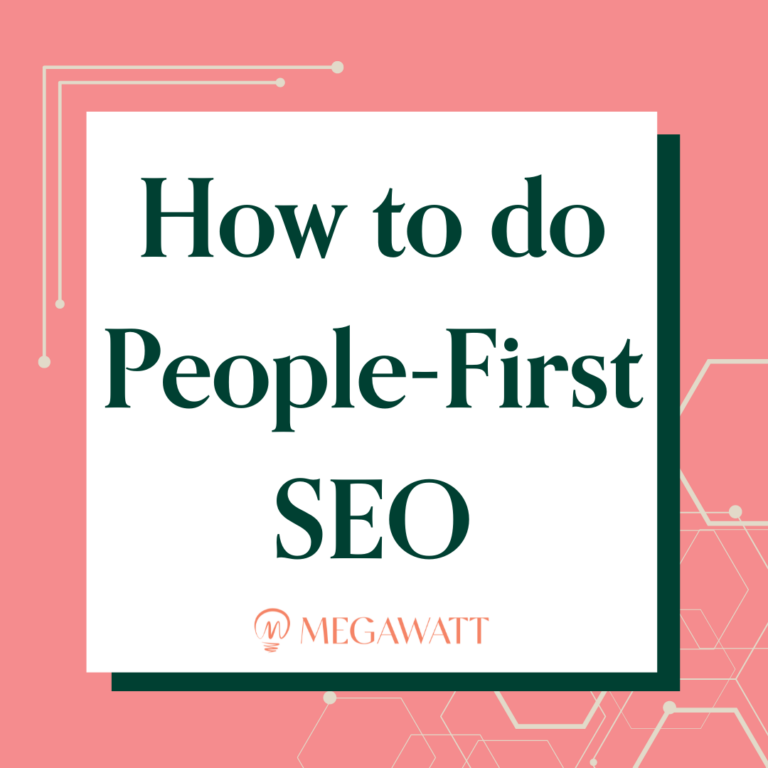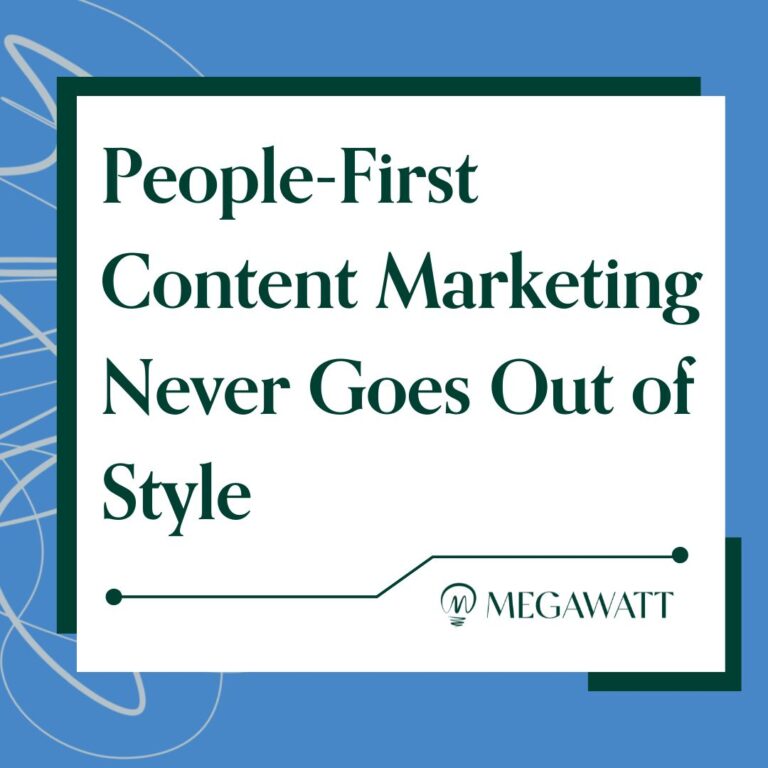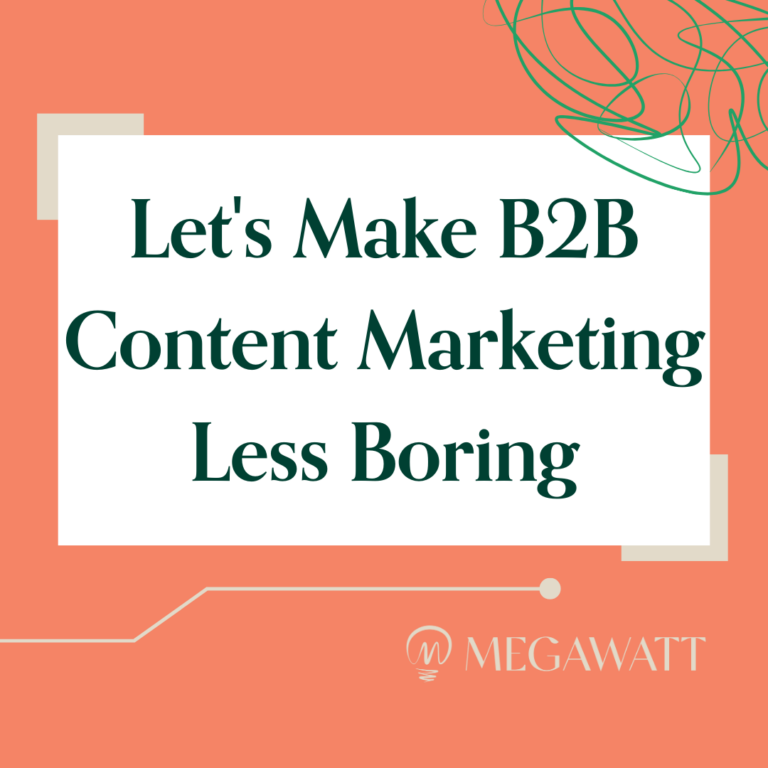In our data-driven world, companies all too often choose lead generation by evaluating their marketing department’s success through every sales metric possible.
But if you’re trying to build a marketing qualified lead (MQL) machine, you’re inevitably going to be disappointed — because that’s not what marketing is designed to do. It’s time to lean more heavily on demand generation (i.e. brand awareness).
Five years ago, I entered the B2B start-up world for the first time: a company with $3M in funding, big ideas and notable backers. It was a hungry twenty-something tech marketer’s dream. But just six months later, start-up reality hit. We were out of money and the marketing team was the first to go.
The experience illuminated a truth that has informed my role as a marketer ever since:
You can run marketing in a way that’s indispensable during tricky times, or you can run marketing so that it’s the first thing to go.
B2B marketers — it’s time to swap qualified leads for quality stories!
| If you want an expert B2B content marketing agency to help you create, strategize and market your B2B tech content click here! |
3 Ways to Create a Marketing Engine without Relying on MQLs
According to a study by MarketingSherpa, 79% of marketing leads never convert to sales. Marketing, at its core, is about stories. It’s about connection. It’s about demand. Hence the term “demand generation.”
That’s why I firmly believe the popular approach to B2B marketing needs to shift from sales to storytelling. The age of marketing focused on leads (i.e. lead generation) is over; instead, we need to focus on customer needs.
Let’s take a look at three ways B2B marketers can build a marketing strategy that’s a revenue generator instead of a cost center by replacing lead generation with quality stories.
1) Get Off the MQL Hamster Wheel and Focus on Customer Pain Points
If you’re a B2B marketer, you know what I mean when I say every month is a race to your numbers:
And if you’re an executive reading this, let me share an unfortunate truth: If your marketing team is spending all their time scrambling to make MQL goals, then they’re likely not working on any form of long-term strategy. It’s not just you; it’s an industry-wide problem.
Marketing teams at B2B tech companies are often tasked with achieving MQL goals that are unrealistic and increase year over year, making it almost impossible to define and implement a comprehensive strategy.
Often, performance marketing and lead generation win out over building awareness or leveraging the power of branding.
As head of EY’s CMO practice, Janet Balis wrote in Harvard Business Review, “leading CMOs recognize that it is a fine balance of brand and performance marketing that delivers the best results, and they must fight hard against a bias toward that which is most easily quantified.”
Here’s an example of why a data-driven mindset can be harmful.
Let’s say Company X is hungry for leads, so they plan a webinar campaign with high-level thought leadership information. Marketing generates 300 registrations, 25% of whom attend. Most companies will take these 300 registrants, mark them as MQLs, and pass them to sales.
But just because these people registered for your webinar doesn’t mean they’re ready to buy (or even have a conversation about buying). They are in research mode. In my experience, sales teams are usually unsuccessful in converting these leads to opportunities.
The result? MQL conversion rates suffer — which negatively impacts all the metrics down the funnel. The marketing team wasted valuable time trying to generate MQLs when those leads were:
- likely only in the awareness phase of their buying journey, and
- could have easily been found by your sales team on tools like LinkedIn or ZoomInfo
Marketing should be focused on creating real customer demand, not drumming up contact information. Escaping the MQL hamster wheel will empower marketers to spend their time building the brand, positioning your company in the market, and actually solving customer pain points.
| If you want an expert B2B content marketing agency to help you create, strategize and market your B2B tech content click here! |
2) Get to Know — Really Know — Your Customer
Of course, in order to solve customers’ pain points, marketers need to understand their customers.
While all marketers are familiar with their customers, the intensity of metrics has led many teams to rely on personas in place of people. You may know the exact demographics of your ideal customer…
…but when’s the last time you spoke to a real customer?
Customer need is a key differentiator between marketing for lead generation and demand generation:
- When you prioritize generating leads, you often miss out on filtering for actual intent to purchase, which impacts your metrics all the way down the funnel.
- But if you focus on demand, your goals of generating interest in your product within your buyer’s environment inherently translate to potential customers.
Start simple.
Spend a week scheduling discovery conversations with your actual customers so you understand their day-to-day problems. Are there limitations in your company that prevent you from speaking to customers? Ask your pre-sales, sales or customer success colleagues if you can sit in on their calls. Create a list of questions you hope to get answers to on these calls, and share them ahead of time with whomever is leading the call. Listen to what prospects and customers are saying.
From there, you’ll be able to begin shaping a narrative for your company that speaks directly to these issues.
3) Create a Strong Narrative with Quality Content
One of my “aha” moments as a marketer was when a team member turned to me and asked, “What happened before we could track all of these metrics?”
The answer: Marketing was seen as a way to get your story out into the world, not as a line item that needed to deliver 100% ROI. And while we can prove ROI these days, it shouldn’t come at the expense of strong storytelling.
For more than a decade, content has been the foundation of my success as a marketing strategist for B2B tech start-ups and scale-ups. That’s because quality demand generation depends on quality content:
Once you understand your customer’s core pain points, you can map your buyer’s journey and create a robust content strategy for every step along the way. With a content calendar, you can then plan multi-channel campaigns around the content — repurposing the value of what you’re creating into all of your marketing assets, from email newsletters to webinars to social ad copy.
With a full-funnel approach inspired by real customer problems, you’ll be able to move interested individuals toward a purchase in an organic and genuine way.
There’s so much noise in the market, with sales people and marketers asking for 15 minutes here or offering a demo there. That’s why bottom-of-the-funnel campaigns don’t work without content-driven, top-of-the-funnel campaigns explaining why customers should care and how you’ll make their lives easier. You need to answer these questions up front, in your content, in order to generate demand for your product.
Related Content: B2B Content Marketing: 3 Categories of Content for Your Marketing Funnel
Summary: Build a Demand Generation Future
Marketing might not lead to instant gratification or purchases for B2B products, but it will lead to trust and strong relationships — two critical markers of customer satisfaction.
You should still track KPIs for your campaigns (marketing is an art and a science), but make sure those KPIs are actually relevant to the project. For example, if it’s a display ad, focus on impressions, clicks and the growth of your retargeting pool. If it’s an article, pay attention to page views, engaged time and exit rates.
My (potentially) controversial take? Let’s get rid of lead generation for marketers all together. It’s time to build the demand generation marketing future, and market in a way that serves the customer before selling to them.
| If you want an expert B2B content marketing agency to help you create, strategize and market your B2B tech content click here! |
What are your thoughts on demand generation vs. lead generation? Let us know on Twitter @megawattcontent!






